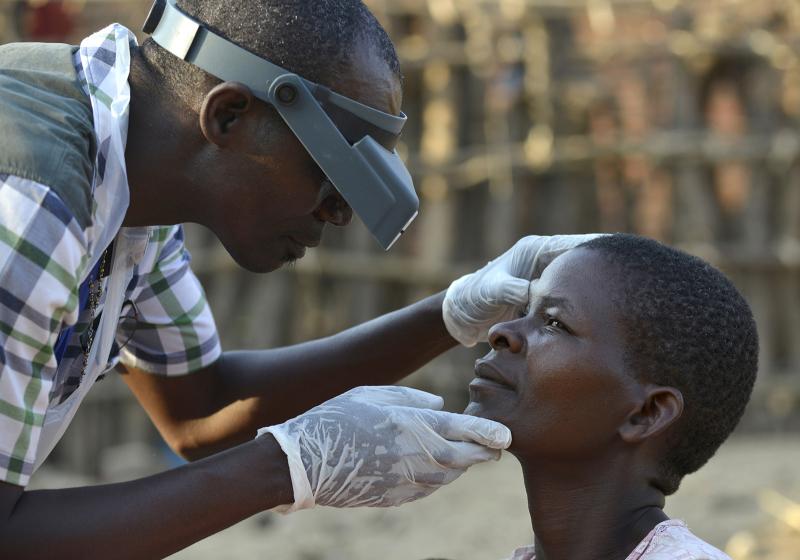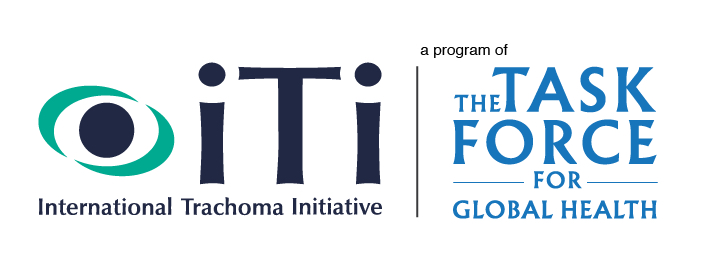
Ending a plague with smartphones
Ending a plague with smartphones
I’ve got good news: a debilitating blinding illness is on the brink of elimination, in part thanks to smartphones.
Trachoma, the world's leading infectious cause of blindness, causes blindness through repeated infection by the bacterium Chlamydia trachomatis, which causes scarring on the inside of the infected eyelid. This scarring leads the eyelid to curl inward, causing the eyelashes to scratch the cornea until the individual becomes irreversibly blind. The International Trachoma Initiative (ITI) is one of many essential cogs in the machine to fight trachoma, tasked with management of Pfizer’s humanitarian donation of Zithromax® for the elimination of trachoma.
I want you to do something for me: think about that time a gust of autumn wind blew a piece of dried leaf into your eye and you cried out in agony, telling your walking companion, "Get it out! Get it ouuuuttttt!" Now scroll up and re-read the description of what happens with trachoma.
No, really – read it again.
The lens through which I view life and the world around me has been forever changed by my years with the International Trachoma Initiative (ITI) at the Task Force for Global Health. While being pushed to my limits physically, emotionally, and mentally, to support work across more than 50 countries, I have also developed a deep appreciation for the distinct cultural beauties of the countries with which we are privileged to collaborate. Through this work, I have seen not only the innate will to survive of human nature, but a tireless will to thrive. There is no "close of business" or "hard stop" for the dedicated national health workers I work with— no temperature too high, no village too remote. If there is a way to accomplish their goal, they will find it.
The dedication of the national health workers, as well as that of my colleagues at ITI and NGO partners, has changed the way I work. Their example pushes me to work harder and smarter, to increase efficiency and improve impact. These exemplary individuals are the reason I get much satisfaction and personal joy from being involved with Tropical Data, a system led by the World Health Organization (WHO), in partnership with ITI, Sightsavers, and RTI International through the ENVISION project.
The goal is simple: eliminate trachoma. The list of partner organizations (USAID, DFID, OPC, FHI360, and others) is long because the mission is clear and universal— we are working to end a plague.
So, how do we do it? With surgery, antibiotics, facial cleanliness & environmental improvement (SAFE strategy).
Where do we do it? Review our map at trachomaatlas.org.
How do we fill-in the map? Review the data.
How do we get the data? Household-level trachoma surveys.
Surveys? That doesn't sound too bad, right?
Now imagine riding in a car in 105 degree heat (40 degrees centigrade) for hours on end in search of a trachoma-affected village, on roads with potholes so deep and wide you fear they may swallow your car whole. The national Ministries of Health are sending their best and brightest graders (ophthalmic health workers) and data recorders into the unreachable corners of their country to examine residents and collect data on smartphones. With a Wi-Fi connection or a SIM card, field teams press a button and immediately transfer data to cloud-based data storage. The data are then quickly cleaned and analyzed in order to inform real time programmatic decisions. For example: in June 2016, survey teams in Malawi completed surveys in two districts, submitted their data, and were approved for drug donation within two hours, possibly before the field teams even started their engines to head home from the last village surveyed in that area.
This is exciting. Even more exciting? This is just the beginning.
While transmission of data using smartphone technology is not especially novel, the introduction of Tropical Data services has taken the use of technology to the next level. Tropical Data builds on the success and experience of the Global Trachoma Mapping Project. With uncompromising emphasis placed on national ownership of high quality data, Tropical Data has streamlined multiple complex processes including:
- Protocol and budget development
- Coordination of training
- Provision of equipment
- Technical assistance with collection, storage, management, cleaning, analysis, approval, and provision of data
Oh- and did I mention that all Tropical Data services are free of charge?
There may be some statistical bias in my assessment, but I can unequivocally state that I cannot imagine a more passionate and dedicated group of individuals – at ITI, partner NGOs and Ministries of Health – working together to fight a disease. Join us and strengthen our fight!
Trachoma doesn't stand a chance.
Learn more about ITI’s work at: www.trachoma.org
Request Tropical Data support here: http://application.tropicaldata.org/
Beck is a speaker at the 2017 SXSW.

